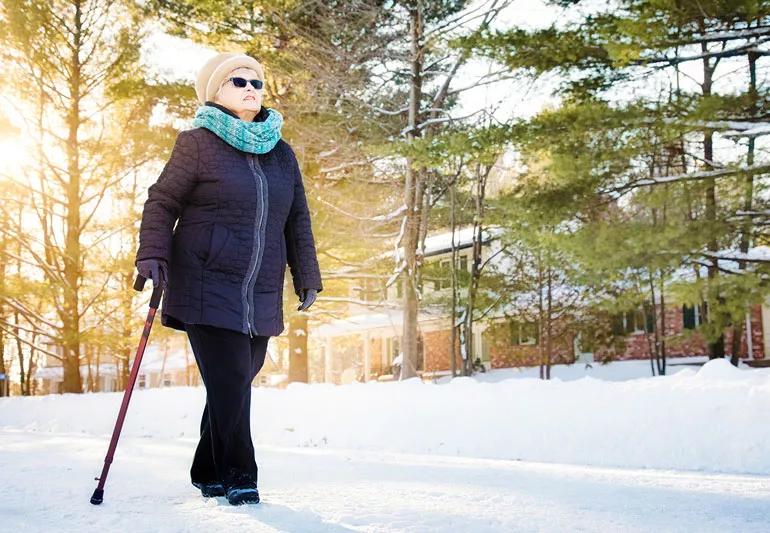Staying active plays a critical role

Image content: This image is available to view online.
View image online (https://assets.clevelandclinic.org/transform/8b665bf9-d95b-420b-b51b-daee2ad6e8a3/elderlyWomanWalking-637923060-770x533-1_jpg)
elderly woman walking outside
The word “frail” often is used to describe the appearance of an older adult. The term itself suggests vulnerability, slowness and disability. The medical definition of frailty requires that three of these characteristics be present:
Advertisement
Cleveland Clinic is a non-profit academic medical center. Advertising on our site helps support our mission. We do not endorse non-Cleveland Clinic products or services. Policy
Unfortunately, low physical activity is a common way of life for many Americans. “I can honestly say that physical activity and/or exercise is probably the most difficult prescription for my patients to fill,” says geriatric specialist Ronan Factora, MD.
We asked Dr. Factora how you can avoid getting frail as you age.
Dr. Factora says, with older adults, much of their time is spent in sedentary pursuits.
“If they’re not watching TV, then they’re in front of some type of a screen (such as a computer or handheld device), reading, doing puzzles — anything but moving around,” he says. As a result, the muscles in these older adults lose their functional capacity and tone, and may eventually become infiltrated with fat.
Aside from the obvious change in muscle tissue, an older adult’s ability to function is also affected. “As a result, this also leads to reported physical exhaustion, muscle weakness, and potentially a decline in walking speed,” says Dr. Factora.
He says lack of physical activity alone also could lead to decline in walking speed due to a loss of muscle tone, muscle function, and cardiovascular endurance.
Advertisement
“Low physical activity is not only a consequence of weight loss and muscle mass loss — it can become a cause,” says Dr. Factora.
This leads to a downward spiral in consuming adequate calories. Dr. Factora says when you’re not physically active, your appetite dwindles, and this can lead to inadequate protein and calorie intake which are what your body uses to maintain muscle mass and support further physical activity.
“Higher physical activities compel a person to actually eat more and replenish their body with the calories it needs.”
It’s clear how all of these frailty characteristics are interrelated. “Developing frailty does not happen overnight,” says Dr. Factora. “It takes years for frailty syndrome to develop as a consequence of low physical activity and weight loss. When it does develop, reversal is extremely difficult.”
Generally speaking, people want to maintain independence and a good quality of life while aging, and they want to avoid disability as much as possible. Many people mistakenly assume frailty is part of normal aging. It’s true that many aging persons do become frail, but there are a number of interventions that can prevent or even reverse frailty.
Though it may seem simple, all individuals should do the following to help reduce the risk of developing disability and frailty:
“Making a physical activity routine sounds easy and straightforward, but from my clinical perspective, regular exercise can be difficult for older patients to sustain,” says Dr. Factora.
Despite the challenge, this simple intervention can be the foundation for avoiding frailty and disability and maintaining independence into later life.
Advertisement

Sign up for our Health Essentials emails for expert guidance on nutrition, fitness, sleep, skin care and more.
Learn more about our editorial process.
Advertisement
Different types of yoga poses, meditation and breathwork may help you feel more emotionally balanced
There’s very little scientific evidence that this alternative medicine practice works
Spoiler alert: Science doesn’t back the numerous health claims
This traditional Chinese medicine practice may boost mental health, immune function, balance and more
This ancient form of exercise can offer a physical and mental boost
Many claims lack science-backed research, but halotherapy is popular and considered safe
This five-day exercise plan for beginners includes three days of resistance training, two days of cardio and two days of rest
If you don’t have an underlying condition, cold plunges might help ease sore muscles, decrease inflammation and even heighten your focus
Although it could be used as a moisturizer, this new trend is not recommended
Communicating clear limits helps protect your time, energy and emotional well-being
High cholesterol can be genetic, but testing and treatment can lower your heart disease risk